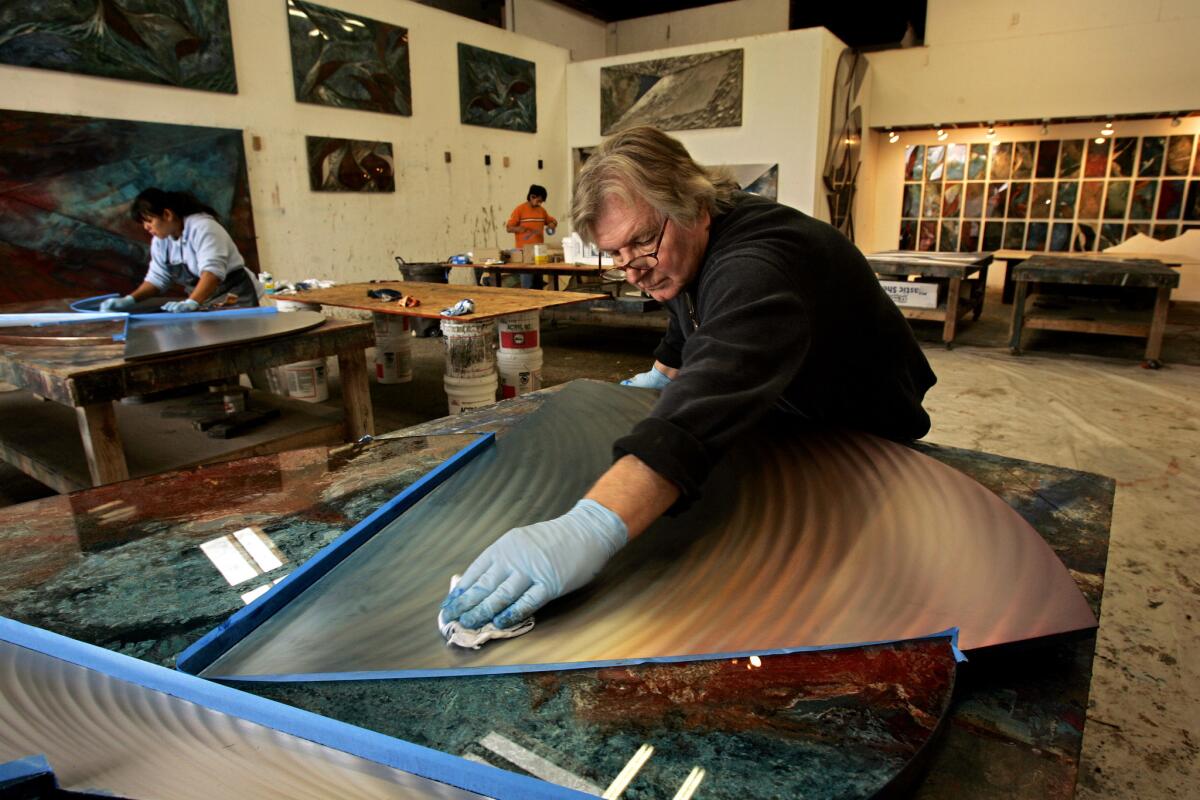Court rejects royalties for artists in out-of-state sales

- Share via
Reporting from San Francisco — California owners of fine art will not be required to pay artists a share of the profits when the work is resold out of state, a federal appeals court decided Tuesday.
In an 8-3 decision, the U.S. 9th Circuit Court of Appeals struck down a provision of a 1976 state law that required Californians to pay 5% royalties to the artist if the sale occurred in California or if the owner was a Californian who sold the work out of state. The law is the only one of its kind in the United States, though similar requirements exist in a some other countries.
If a California resident has a part-time apartment in New York, buys a sculpture in New York from a North Dakota artist to furnish her apartment, and later sells the sculpture to a friend in New York,” Judge Susan P. Graber wrote for the majority, “the act requires the payment of a royalty to the North Dakota artist — even if the sculpture, the artist, and the buyer never traveled to, or had any connection with, California. “
The majority said that portion of the law violated constitutional restrictions on state regulations that interfere with other states’ commerce. The ruling left intact the requirement California sellers pay the artists the royalty if the sale takes place within the state.
The decision stemmed from class-action lawsuits by artists and their families against Sotheby’s, Christie’s and eBay. The artists, including Chuck Close and Laddie John Dill and the estate of the sculptor Robert Graham, argued the sellers had violated California law by failing to pay the royalties. Some sales took place in California and others outside the state but on behalf of California residents, the suits said.
A district court judge overturned the law in 2012 on the grounds that the provision on out-of-state resales rendered the entire act unconstitutional. The 9th Circuit disagreed, ruling the unconstitutional provision could simply be struck from the law. The artists will now be able to argue other claims in their lawsuits.
“Even with the act’s scope partially limited, California auction houses, dealers and collectors will now know their obligations under the law,” said Eric George, a lawyer for the artists. “This artists’ rights measure is an important one, and we look forward to proceeding with our claims.”
For years, California gallery owners have complained about the law. They have argued that it placed an unfair burden on California sellers. Supporters, including artist Robert Rauschenberg, countered that it gave artists the right to share in the appreciation of their work.
“It’s very important that for L.A. to remain a major international city that the playing field is kept on the same level as cities like New York and Chicago,” said Doug Chrismas, director of Ace Gallery in Los Angeles.
The law requires art dealers to withhold 5% of the amount of the sale and locate and pay the artist. If the artist cannot be found, the money must be given to the California Arts Council. If the council is unable to locate the artist after seven years, it may use the money to buy fine art.
As of March 1, 2012, the California Arts Council had received $339,173.09 in royalties from a total of about $6.78 million in art sales. The council has no records showing how much sellers paid directly to artists or revealing the entire amount sellers might have owed artists under the law.
Three of the judges on the 9th Circuit panel partially dissented, saying the law should be struck down only as it applied to out-of-state auction houses or galleries that perform the transactions outside California.
Judge Stephen Reinhardt said the majority should simply have dismissed the auction houses from the litigation instead of removing a requirement that “for the last 39 years has secured invaluable benefits for talented artists.”
“By striking down not only the act’s out-of-state applications to the two out-of-state agents, but also its applications to the in-state actions of California art owners who receive money from out-of-state sales,” Reinhardt wrote, “the majority opinion goes far beyond what is necessary to decide the case.”
The California law exempts some resales, including those for less than $1,000 and those involving an artist who died before 1983. Failure to comply with the law gives artists and their heirs the right to sue and collect attorney fees.
A spokesperson for Sotheby’s said the auction house was pleased with the court’s decision.
Twitter: @mauradolan and @davidngLAT
More to Read
Sign up for Essential California
The most important California stories and recommendations in your inbox every morning.
You may occasionally receive promotional content from the Los Angeles Times.















